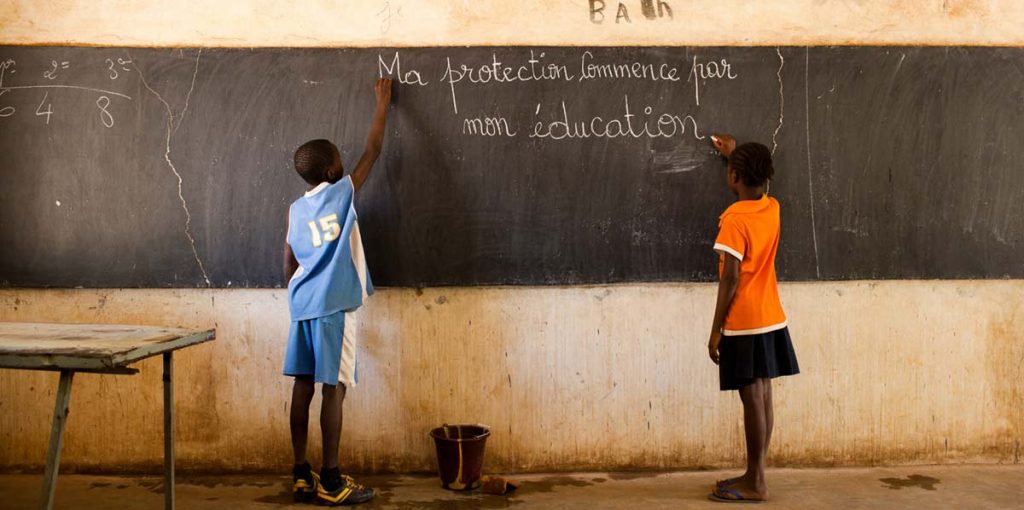
Mali
International Medical Corps has worked in Mali since 2013, helping people affected by political instability and a coup d’état that caused mass displacement and the disruption of many public systems, including healthcare. While the violence and insecurity in the north aggravated the already-fragile health and nutritional conditions in the region, women and girls became increasingly exposed to acts of sexual violence.
To support those affected by the conflict, International Medical Corps provides lifesaving assistance to address the immediate needs of vulnerable populations in north and central Mali. Interventions focus on nutrition; maternal, newborn and child health; and violence against women and girls, including the prevention of sexual exploitation and abuse. We currently operate in six regions, supporting 109 health facilities, two mobile clinics, and four women’s and girls’ safe spaces (WGSS), benefiting more than 425,500 people.

22 million
61/62
male/female
91 deaths
per 1,000 live births
The Challenges
Our Response

Infectious Disease Prevention and Response
International Medical Corps has provided training in the management of infectious diseases, such as Ebola, to medical and non-medical personnel from the public and private health systems, Malian Ministry of Health, partner agencies and Red Cross. In response to the COVID-19 outbreak in Mali, we provided training to hundreds of such personnel, and participated in the disinfection of key public places in Timbuktu and Gourma Rharous. We also provided infection-prevention-and-control and materials related to water, sanitation and hygiene—including handwashing devices, soap, disinfectants, gloves, face shields and masks—to nearly 200 healthcare facilities, as well as at public places and WGSS across five regions. International Medical Corps continues to provide logistical support for the transportation of patients with infectious diseases.

Health
We work to address deficits and inequities in healthcare delivery by improving how healthcare services are provided, and by meeting the growing demand for access to these services, especially in remote areas. We are one of the few organizations operating mobile health teams, and support referrals between the community, primary healthcare facilities and secondary healthcare facilities in Bamako, Mopti, Ségou, Sikassa, Taoudénit and Timbuktu, despite the geographical complexity of the area and the unstable security context. We provide curative consultations and antenatal care, and help to ensure that maternal deliveries are assisted by qualified personnel in International Medical Corps-supported health facilities in Timbuktu and Gourma Rharous. In Segou, we also support free healthcare targeting malnourished children by supporting the inpatient and outpatient management of severe acute malnutrition.

Nutrition
International Medical Corps helps community health centers in northern Mali prevent and treat malnutrition by training healthcare providers in its treatment, by providing nutrition supplies and medication, and by strengthening the referral systems between community health centers and regional health facilities and hospitals. Within communities, we train community health volunteers on how to identify and refer malnourished children, as well as malnourished pregnant and breastfeeding women—and ultimately identify cases early, before they are complicated and harder to treat. To prevent malnutrition, we promote the care-group model, which uses volunteers to encourage mothers to adopt practices known to improve child nutrition. International Medical Corps implements community-based management of acute malnutrition activities focusing on prevention and management of moderate acute malnutrition and severe acute malnutrition for children under 2, and for pregnant and lactating women.

Protection
Rates of violence against women and girls in Mali significantly increased during the recent conflict in the north. We work in health facilities in Gourma-Rharous and Timbuktu districts to provide confidential and compassionate clinical and psychosocial care to survivors. We also work with communities to train community volunteers and local health staff and design referral paths to other relevant services. Protection interventions focus on the prevention of sexual assault, clinical and psychosocial management services for survivors of sexual assault, and how to increase the resilience of communities.
We provide survivors with psychosocial and medical care or support, and provide training on various topics related to violence against women and girls, including basic concepts, case referral and facilitation techniques, and women’s leadership.



